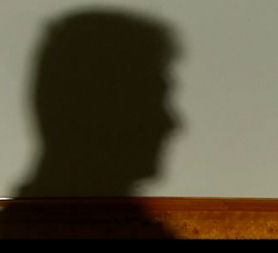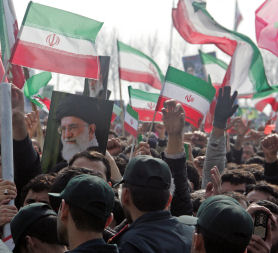Iran: former militia member’s jail ordeal
 Lindsey Hilsum
International Editor
Lindsey Hilsum
International Editor
A former member of the Iranian Basij militia tells Channel 4 News International Editor Lindsey Hilsum that he was jailed and mistreated for refusing to assault opposition protesters.

Warning: the following testimony contains details of violence and sexual assault.
The former militia member told Iranian authorities he would not participate in the brutal crackdown on opposition supporters after the disputed presidential elections in June 2009.
Ali, not his real name to protect his identity, spoke to Channel 4 News International Editor Lindsey Hilsum about the harsh treatment he said he endured when he objected to the tactics used against critics of the Iranian regime.
He said: “There was a table. I stood on that table for some hours with my hands tied and a rope around my neck. They came a few times and said they’d come to execute me now, or in an hour.”
Lindsey Hilsum first heard about the former Basij member in December 2009 when Channel 4 News broadcast a story about Basij leaders who had allegedly ordered the sexual assault of young people who had been involved in protests.
“The first time they took me for interrogation they struck me so hard in my left eye that I couldn’t see for a while.” ‘Ali’
Ali was part of a group of Basij who refused to take part. He was jailed and then fled to Britain.
Ali said: “The people were terrified. Some were already injured, their wounds had not been seen to. This was all very distressing for me because until then I had had very different responsibilities, not the beating up and crimes that they were undertaking against the people.”
Speaking of his time in prison, he said: “The first time they took me for interrogation they struck me so hard in my left eye that I couldn’t see for a while. After the second day I could see a little, I thought I’d gone blind in my left eye. I still have problems with it, it’s never returned to normal.
“They created execution scenarios. They said we’re going to kill you and we’ll link your death to the protests. We’ll say that you were killed during a protest. There was a table. I stood on that table for some hours with my hands tied and a rope around my neck.
Click here for the full transcript and video clips

What is the Basij?
Basij means "mobilisation" in Persian.
The Basij Resistance Force is a large paramilitary organisation affiliated to the Islamic Revolutionary Guards Corps IRGC).It has a reported 13 million members (which would equate to 20 per cent of Iran's population).
Formed in 1979 under orders from Ayatollah Ruhollah Khomeini, it acts as the "eyes and ears" of Iran's Islamic regime.
Basij members act as "morality police" in towns and cities.
The IRGC provides weapons to certain battalions within the Basij.
It has five units: the Pupil Basij, the Student Basij, the University Basij, the Public Service Basij, and the Tribal Basij.
Members of the youngest wing, Pupil Basij, are aged 12-15.
The IRGC provides weapons to certain battalions within the Basij.
Mohammad Reza Naqdi, the current commander of the Basij, has been accused of carrying out torture and taking part in a bloody crackdown on student protests in 1999.
They came a few times and said they’d come to execute me now, or in an hour. I was very worried. Then they came and pulled the table away. I fell. I thought I was saying goodbye to this world.
“You see your own disintegration. When they pulled the table, the rope wasn’t attached to anything. I fell backwards. I fainted.
“When I came to I was wet. They had thrown water over me. I vomited. They took my confession then and I signed.”
Ali said his worst experience in prison was seeing his friend, another member of the basij, sexually assaulted.
“My friend, who shared my cell, created havoc. He’d never seen anything like this. Well, nor had I. He was in shock. He was confused. He lost control.
“He screamed and shouted, threw himself against the walls. The guards warned him that if was going to continue with this behaviour they would make things worse for him.
“One of the guards came and beat him. His face was bleeding. He tore his clothes off… the baton that he had… he was sexually violated with it.
“When they pulled the table, the rope wasn’t attached to anything. I fell backwards. I fainted.” Ali
“One guard was outside, one inside the cell. I wanted to protest, to shout, to help him, but well, I had seen how they dealt with protesters and I couldn’t protest. I am thoroughly ashamed. I’m shamed before God, ashamed of my youth, ashamed in front of my friend, ashamed in front of the people.
“I have this terrible feeling of pain, that I spent the best years of my life unaware. And they used this. I was a tool. I was a tool for them to reach their objectives. I unwittingly got involved in their plans. I was unknowingly led by them.
“Their slogan was that we were the force of the people, the eminent ones, that we must lead. We were unaware of what they brought on us. Our thoughts were not our own.”
Channel 4 News asked the Iranian embassy in London for a comment, but did not receive one.
In December 2009, in an interview with Channel 4 News presenter Jon Snow in Tehran, President Ahmadinejad was asked about claims that members of the Basij had assaulted protesters.
He said: “There have been clashes amongst some people. How can you find out if he was Basij or another person? In my country the law prevails.”
-
Latest news
-
Post Office scandal: workers react to ex-CEO Vennells at inquiry4m

-
Election 2024: what voters think of Rishi Sunak announcement3m

-
Post Office inquiry: former boss Vennells admits evidence was false5m

-
‘We are going after every vote we possibly can’, says deputy leader of Liberal Democrats4m

-
What’s the mood in Wales for an early general election?7m

-




